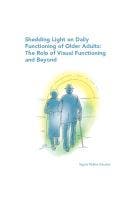Sigrid Mueller-Schotte
Shedding Light on Daily Functioning of Older Adults: The Role of Visual Functioning and Beyond

- Datum
- (Co) promotoren
- 05-07-2018
- prof.dr. M.J. Schuurmans, prof.dr.ir. Y.T. van der Schouw, dr. N. Bleijenberg
Samenvatting
Objective This thesis aimed at investigating various aspects of daily living at older age and the effects of several factors on these aspects. In particular sensory loss, with focus on visual functioning, and common health problems were suited as factors determining daily living (e.g. handling medication and finances, household tasks). Methods Several study designs were used to answer the research questions. First, a cross-sectional study of 120 persons aged 50 to 89 years was conducted investigating the association between ocular straylight and vision-related quality of life and between visual functioning and engagement in cognitive stimulating activities. Second, the prospective relationship between self-reported fatigue for any reason and the long-term risk of limitations in instrumental activities of daily living and/or mobility performance was investigated, using data from a 10-year longitudinal study of 534 persons aged 40-79 years. Third, two longitudinal studies were conducted using data of fifteen studies of the Dutch National Care for the Elderly Program. All studies used the same questionnaire, TOPICS-MDS, encompassing data of 9,319 community-living persons. Trajectories of functional decline in individual activities of daily living and the influence of sensory loss and chronic conditions on these trajectories were estimated. Multivariable logistic, negative binomial, and linear regression models adjusted for confounders were used to estimate these associations. Results Ocular straylight - potentially causing debilitating glare – did not impact the quality of life of older persons. Good contrast sensitivity played a role in engaging in cognitive complex tasks (e.g. puzzles, creative arts). Our study indicated a long-term negative impact of fatigue on the ability to perform activities of daily living and the on ability to walk for men, but not for women. The graphical presentation of functional decline of individual activities showed an increase in limitations with age which appeared to be similar for persons with and without vision and/or hearing problems, except for the activities ‘handling finances’, ‘traveling’, and ‘walking’. The graphical presentation of functional decline of individual activities displayed an activity-specific deterioration with age and the impact of whether or not one suffered from chronic conditions differed per activity. The absence of chronic conditions at baseline imposed a higher probability of decline with increasing age, except for the activities ‘handling finances’ and ‘walking’. Using the telephone and grooming were almost unaltered by age and multiple chronic conditions. Conclusions The studies suggested that ocular straylight may not affect quality of life and that good contrast sensitivity played a role in engaging in cognitive stimulating activities for middle-aged and older persons. Furthermore, self-reported fatigue appeared to be a long-term risk factor for limitations in the ability to perform daily activities and in walking for men but possibly not for women. A decline in the functioning in daily activities with increasing age was observed in persons with and without chronic conditions and/or sensory loss. For some activities, the age-effect on the ability to perform the activity were higher for persons without vision and/or hearing problems and for persons reporting no chronic condition at baseline.
